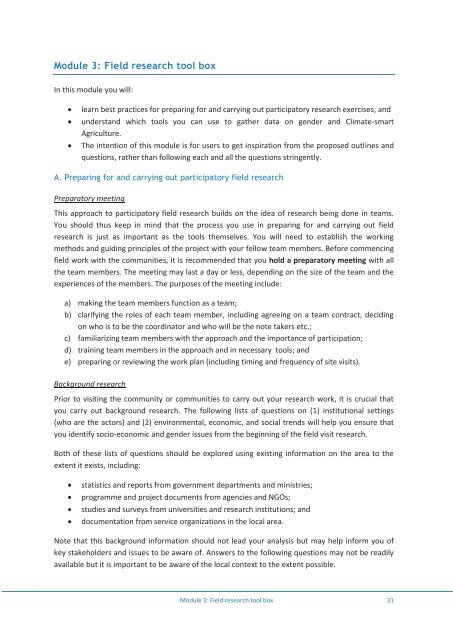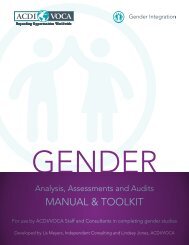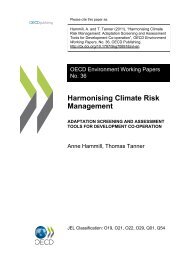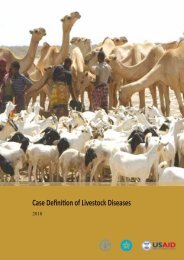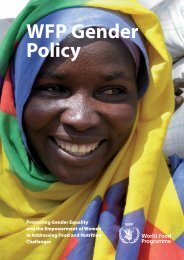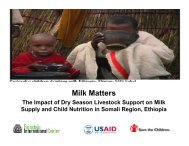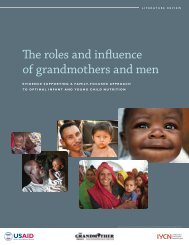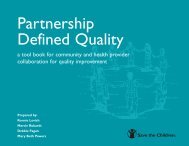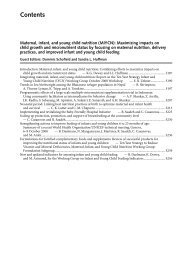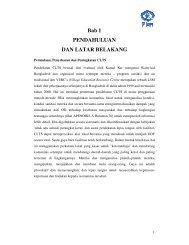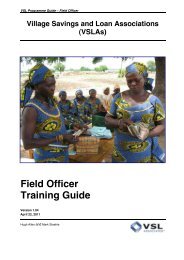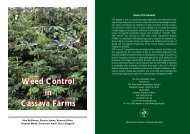Gender and climate change research in - FAO
Gender and climate change research in - FAO
Gender and climate change research in - FAO
You also want an ePaper? Increase the reach of your titles
YUMPU automatically turns print PDFs into web optimized ePapers that Google loves.
Module 3: Field <strong>research</strong> tool box<br />
In this module you will:<br />
<br />
<br />
<br />
learn best practices for prepar<strong>in</strong>g for <strong>and</strong> carry<strong>in</strong>g out participatory <strong>research</strong> exercises; <strong>and</strong><br />
underst<strong>and</strong> which tools you can use to gather data on gender <strong>and</strong> Climate-smart<br />
Agriculture.<br />
The <strong>in</strong>tention of this module is for users to get <strong>in</strong>spiration from the proposed outl<strong>in</strong>es <strong>and</strong><br />
questions, rather than follow<strong>in</strong>g each <strong>and</strong> all the questions str<strong>in</strong>gently.<br />
A. Prepar<strong>in</strong>g for <strong>and</strong> carry<strong>in</strong>g out participatory field <strong>research</strong><br />
Preparatory meet<strong>in</strong>g<br />
This approach to participatory field <strong>research</strong> builds on the idea of <strong>research</strong> be<strong>in</strong>g done <strong>in</strong> teams.<br />
You should thus keep <strong>in</strong> m<strong>in</strong>d that the process you use <strong>in</strong> prepar<strong>in</strong>g for <strong>and</strong> carry<strong>in</strong>g out field<br />
<strong>research</strong> is just as important as the tools themselves. You will need to establish the work<strong>in</strong>g<br />
methods <strong>and</strong> guid<strong>in</strong>g pr<strong>in</strong>ciples of the project with your fellow team members. Before commenc<strong>in</strong>g<br />
field work with the communities, it is recommended that you hold a preparatory meet<strong>in</strong>g with all<br />
the team members. The meet<strong>in</strong>g may last a day or less, depend<strong>in</strong>g on the size of the team <strong>and</strong> the<br />
experiences of the members. The purposes of the meet<strong>in</strong>g <strong>in</strong>clude:<br />
a) mak<strong>in</strong>g the team members function as a team;<br />
b) clarify<strong>in</strong>g the roles of each team member, <strong>in</strong>clud<strong>in</strong>g agree<strong>in</strong>g on a team contract, decid<strong>in</strong>g<br />
on who is to be the coord<strong>in</strong>ator <strong>and</strong> who will be the note takers etc.;<br />
c) familiariz<strong>in</strong>g team members with the approach <strong>and</strong> the importance of participation;<br />
d) tra<strong>in</strong><strong>in</strong>g team members <strong>in</strong> the approach <strong>and</strong> <strong>in</strong> necessary tools; <strong>and</strong><br />
e) prepar<strong>in</strong>g or review<strong>in</strong>g the work plan (<strong>in</strong>clud<strong>in</strong>g tim<strong>in</strong>g <strong>and</strong> frequency of site visits).<br />
Background <strong>research</strong><br />
Prior to visit<strong>in</strong>g the community or communities to carry out your <strong>research</strong> work, it is crucial that<br />
you carry out background <strong>research</strong>. The follow<strong>in</strong>g lists of questions on (1) <strong>in</strong>stitutional sett<strong>in</strong>gs<br />
(who are the actors) <strong>and</strong> (2) environmental, economic, <strong>and</strong> social trends will help you ensure that<br />
you identify socio-economic <strong>and</strong> gender issues from the beg<strong>in</strong>n<strong>in</strong>g of the field visit <strong>research</strong>.<br />
Both of these lists of questions should be explored us<strong>in</strong>g exist<strong>in</strong>g <strong>in</strong>formation on the area to the<br />
extent it exists, <strong>in</strong>clud<strong>in</strong>g:<br />
<br />
<br />
<br />
<br />
statistics <strong>and</strong> reports from government departments <strong>and</strong> m<strong>in</strong>istries;<br />
programme <strong>and</strong> project documents from agencies <strong>and</strong> NGOs;<br />
studies <strong>and</strong> surveys from universities <strong>and</strong> <strong>research</strong> <strong>in</strong>stitutions; <strong>and</strong><br />
documentation from service organizations <strong>in</strong> the local area.<br />
Note that this background <strong>in</strong>formation should not lead your analysis but may help <strong>in</strong>form you of<br />
key stakeholders <strong>and</strong> issues to be aware of. Answers to the follow<strong>in</strong>g questions may not be readily<br />
available but it is important to be aware of the local context to the extent possible.<br />
Module 3: Field <strong>research</strong> tool box 31


